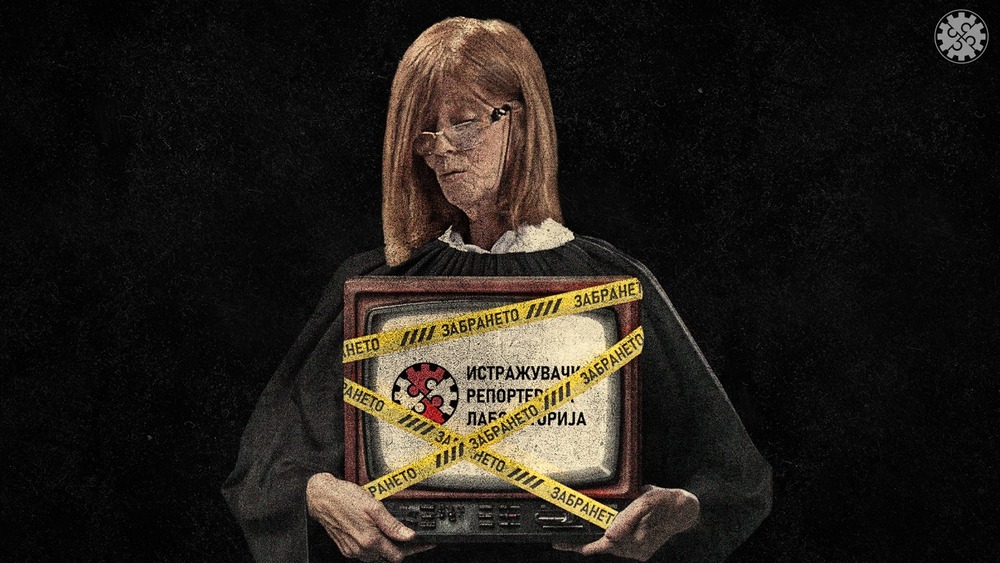The Skopje Civil Court ruled that North Macedonia’s Investigative Reporting Lab (IRL), a partner of OCCRP, had no right to publish a documentary on the import and burning of dirty oils of poor quality. quality, because it is a non-governmental organization and not a non-governmental organization. media.
 IRL, North Macedonian media partner of OCCRP, affected by a SLAPP. (Photo: IRL)The judge, Jovanka Spirovska Ganeva, also suggested closing the IRL for violating the law because it inappropriately published information “slandering” Kocho Angjushev, a North Macedonian oligarch and former high-ranking politician.
IRL, North Macedonian media partner of OCCRP, affected by a SLAPP. (Photo: IRL)The judge, Jovanka Spirovska Ganeva, also suggested closing the IRL for violating the law because it inappropriately published information “slandering” Kocho Angjushev, a North Macedonian oligarch and former high-ranking politician.
Saška Cvetkovska, editor-in-chief of IRL, called the judge’s decision “shocking”, because for more than six years the laboratory has been publishing articles online, working closely with other media and broadcasting documentaries at a growing audience.
“Few things shock me as a media professional in a country with a long history of hostility towards journalists… (but) being threatened with being banned from working as a media person” is a direct attack on freedom. speech, Cvetkovska told OCCRP.
She added that IRL is constantly “under pressure, intimidation, threats and harassment from those who hold political and economic power.”
Angjushev, the country’s former deputy prime minister, sued IRL for defamation and insult, in what appears to be a typical example of a strategic lawsuit against public participation, or SLAPP.
“Saška and her team have decades of experience as journalists, and the award-winning IRL has been publishing investigative reporting in North Macedonia for six years,” said OCCRP Publisher Drew Sullivan. “The court’s characterization of IRL as ‘non-media’ and its threat to shut them down is outrageous and represents a new low in the world of SLAPP suits that many investigative journalists constantly fight.
The documentary “Conspiracy against the air” was part of a joint OCCRP and IRL investigation titled “Bad Oil – “The European Dump”: How dangerously polluting oil ended up heating North Macedonia’s hospitals. » The investigation, published more than two years ago in May 2021, identified Angjushev as an official who may have played a role in the process.
Angjushev served as deputy prime minister for economic affairs from 2017 to 2020 and is one of the country’s richest men. The owner of several companies, he sued IRL over the documentary, which examined how dirty, low-quality oils arrived in North Macedonia and their possible impact on the Balkan country’s significant air pollution.
The latest decision is the third in this case. Originally, the same judge of the Civil Court had exonerated IRL of defamation. Angjushev appealed and won a new trial, this time with a diametrically opposed decision.
The judge excluded the public from the third trial, according to IRL.
IRL Macedonia was founded in 2017 and has since expanded to produce the investigative magazine Provereno, broadcast every Tuesday on the TV24 newspaper. Its reporting and editorial teams have produced dozens of articles on topics including Russian interference, fake news and assets owned by politicians.
IRL also claims that Angjushev wields enormous power over the courts.
“In our case, he’s only asking for one euro ($1.06), so it’s not about money,” IRL said, adding that Angjushev is simply using this lawsuit to undermine the organization.
In her ruling, Justice Ganeva said she believed the right to privacy was more important than freedom of expression.
She appears to base her decision on the fact that IRL is an online publication rather than a traditional newspaper, calling it an organization “without media properties” and whose “members cannot have journalist status”, and therefore “cannot position themselves as journalists”. »
Judge Ganeva wrote that “IRL journalists are not journalists, they are members of the organization” and that Cvetkovska “cannot be editor-in-chief.”
Vasko Popetreski, president of the Association of Journalists of North Macedonia, believes that the verdict is “dangerous and should not be followed by silence, because the judgment tries to promote the obtaining of a ‘license’ for journalists, and this by a state institution. , which does not exist in any democratic country.
He believes that if anyone should decide who is a journalist, it should be the Journalists’ Association and not the courts.
Other national and international journalist associations denounced the decision of the Skopje court.
Throughout the proceedings, the International Federation of Journalists (IFJ) and its North Macedonian affiliates – the Association of Journalists of Macedonia (AJM) and the Independent Union of Journalists and Media Workers (SSNM) – disputed that journalists should not be considered a public evil because they work for the public good.
“Journalism is a public good and the job of every journalist is to uncover the dysfunctions of the system,” said Pavle Belovski, president of SSNM. He stressed that the court decision against IRL is “a typical example of disregard for the public interest”.
“We regret that the court accepted this typical SLAPP suit, which is filed precisely to intimidate and demotivate journalists,” Belovski said.
Tim Dawson, deputy general secretary of the IFJ, said it is the responsibility of journalists to expose wrongdoing, corruption and incompetence.
“Unfortunately, those whose activities are exposed are increasingly abusing our legal systems to intimidate and silence their critics. The case of IRL and its editor-in-chief Saška Cvetkovska is an example,” he said.
The IFJ further stated that this court verdict adds to the growing number of cases around the world in which “freedom of expression has been damaged by unjustified legal intimidation and the financial exhaustion of journalists.”

